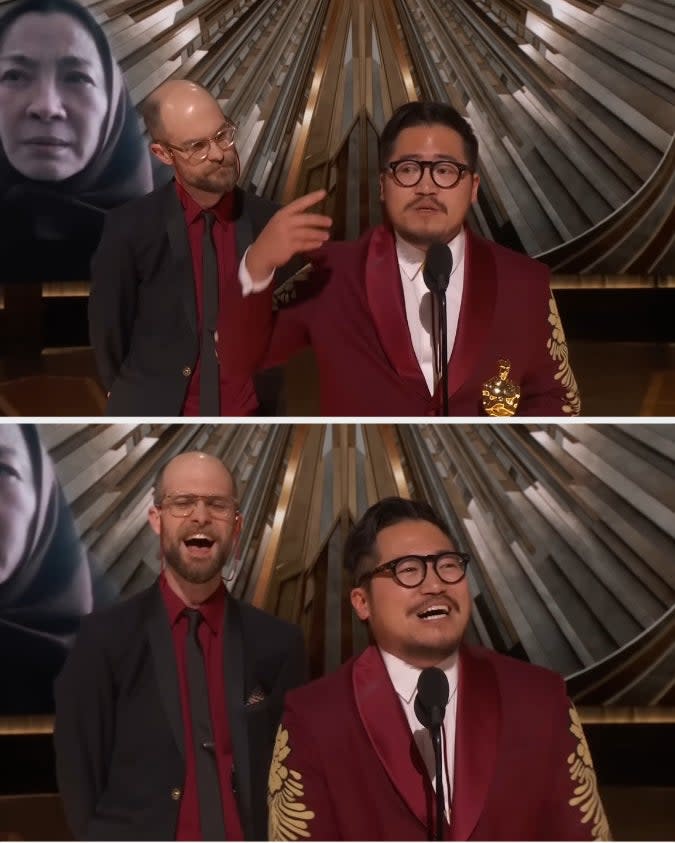I'm A Queer, First-Gen Asian American — Here's What "Everything Everywhere All At Once's" Wins Actually Mean To Me
Hey, y'all, I'm Kim, and I don't know about you, but I've been cheering from the sidelines of Instagram for weeks since awards season began for Everything, Everywhere, All At Once. As a Queer, first-gen kid of Viet refugees, the movie's awards sweep has helped me feel a bit more seen.
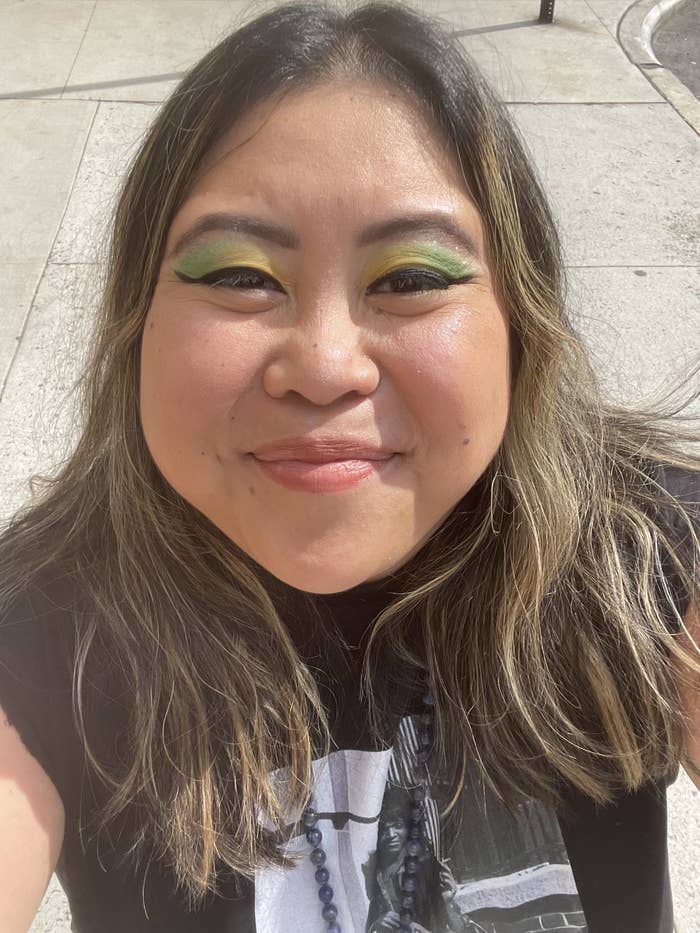
This was me, last year, on my way to my community's PRIDE event at GaneshSpace, after Sunaina Madhav Dāsī did my makeup.
When Michelle Yeoh reminded us her win is a "beacon of hope" and "proof that dreams do come true," I believed her. When Ke Huy Quan thanked his 84-year-old mother for her sacrifices, my inner kid felt a little ping in her heart. And then I lost it when I heard the nuances of their accents during their speeches — which was met by uproarious applause.
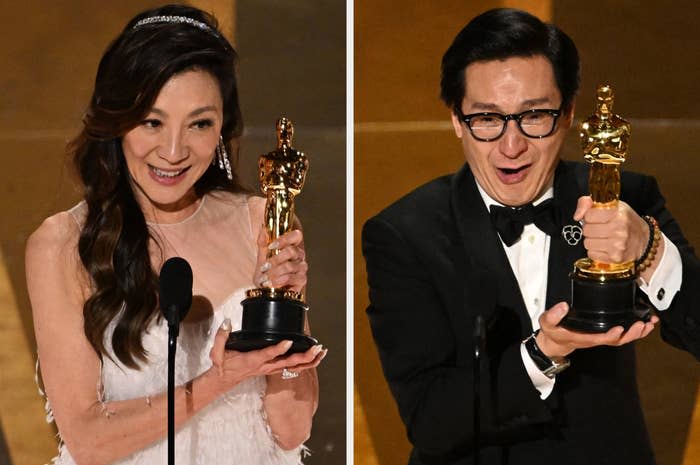
So in no particular order, here are five reasons why this win was so big for the API community, and for me especially, as a Queer, first-gen Asian-American kid:
1.As he accepted his Oscar, Ke Huy called his journey the "American dream," perhaps in its highest form. This one hit home for me, literally. During their speeches, both Ke Huy and Michelle thanked their mothers for their sacrifices. As first-gen kids, we're deeply aware that our parents sacrificed everything for us to have a better life — and most of them do it without fanfare. Ke Huy and Michelle's wins represent what we, too, can achieve as a result of their sacrifices.
it’s about damn time. tonight is dedicated to all the Asian moms, immigrant moms, single moms, working class moms who sacrificed and swallowed bitterness so their children could walk through new thresholds, break through artificial ceilings, and etch their names into history.
My parents escaped the Vietnamese Communist Party on a fishing boat — like Ke Huy — and came here with nothing but a dream that this country would provide a better life for all of us. They both worked countless hours. My mother learned English on the job with the deep hope that my sister and I wouldn't just survive but would motherf*ckin' thrive. That's why beyond representing what we can achieve, Ke Huy and Michelle's wins (and speeches) remind many of us that we are living out our parents' and ancestors' wildest dreams.
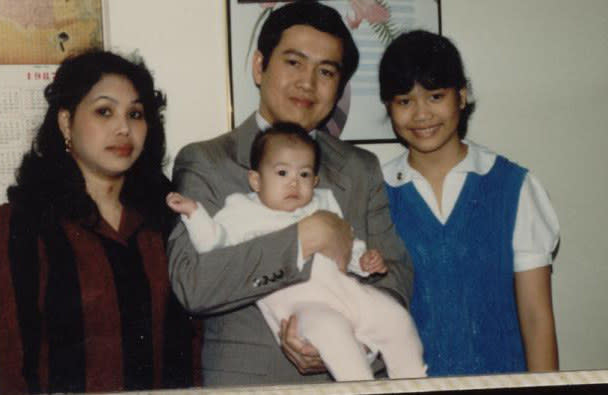
Ke Huy and Michelle reflect our families back at us, straddling both an Asian American and immigrant experience in one.
2.Additionally, both Michelle and Ke Huy have had wild, heroic journeys in their careers, having overcome many ridiculous obstacles in Hollywood. And they didn't just win — they won BIG. Ke Huy's success is arguably one of the best comeback stories in Hollywood, and Michelle's struggle to "make it" as an Asian woman without compromising her values makes her Best Actress win even more special and powerful. Their wins are historical, yes, but they also affirm that hard work pays off — so long as we're given a seat at the table.
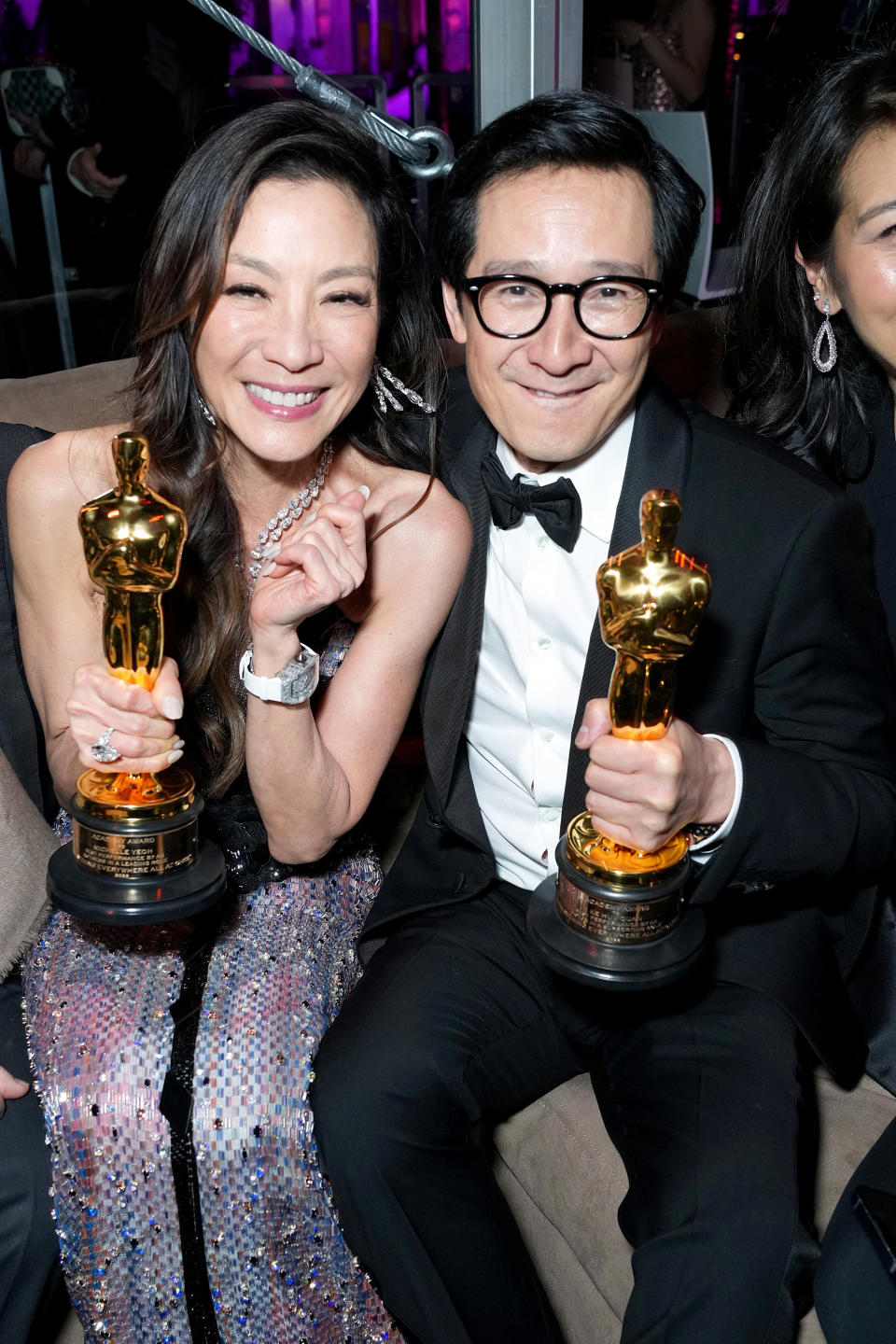
Ke Huy, who is of Chinese descent and immigrated from Vietnam, got his big break at a young age in Indiana Jones and the Temple of Doom in 1984. But after struggling to find work — even after attending acting school — he gave up and took an acting hiatus that ultimately lasted more than 20 years.
Inspired by Crazy Rich Asians, he started putting himself out there again. Soon after, a director stumbled upon his Twitter profile, and he landed the role of Waymond Wang.
Though Michelle found work more consistent work as an actor, it came with relentless challenges and heartbreak, having to battle not only racism but also sexism. She always had to play second fiddle to a male costar — despite often schooling her scene partners in fight choreography even though she has no formal training in martial arts. Now, she's the first Asian woman and second-ever woman of color to win Best Actress.
3.Everything, Everywhere All At Once is especially affirming to Queer API folks. Let me remind you, the movie is about a mother searching the multiverse to save her Queer daughter from herself. In itself, this is extraordinary since many LGBTQIA+ API folks still struggle against deeply-rooted anti-gay sentiment within our cultures.
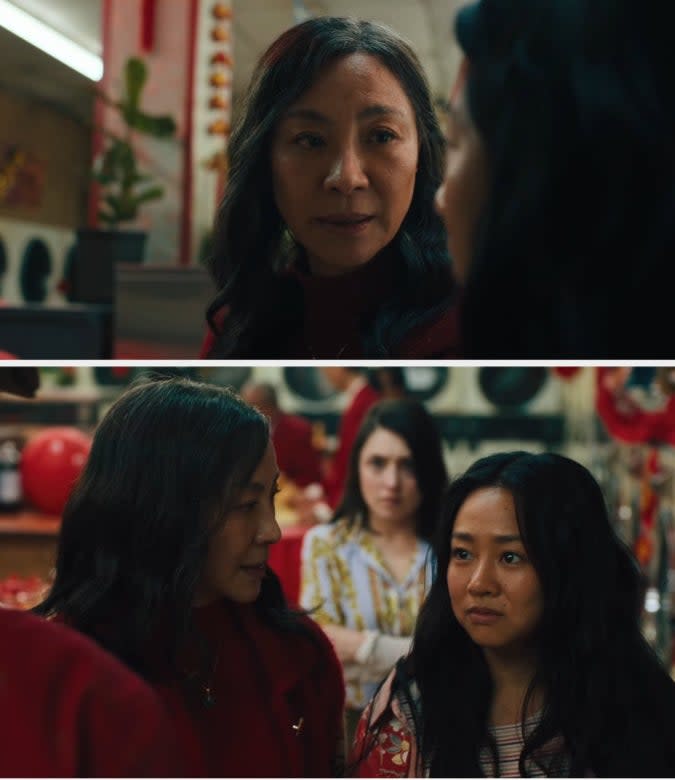
EEAAO is also the second LGBTQIA+ movie to win Best Picture after Moonlight. On top of tackling Queerness head-on, it tackles mental health — something also stigmatized in API communities.
So many of us are taught that there must be "something wrong with you" in order to seek support. EEAAO helps break down that door and open a conversation, especially between API parents and their Queer kids.
More specifically, the movie does an incredible job of showcasing how Asian daughters desire their mothers' approval. And when that isn't given because of sexual identity, it can be devastatingly harmful. Growing up, I mostly saw Queer representation through gay men, which is fab, but I rarely saw stories of Queer women — much less Queer API women. I came into my Queerness later in life, and it makes me wonder — as a kid who bathed herself in pop culture — if I would have discovered myself earlier in life had there been more characters like Joy.
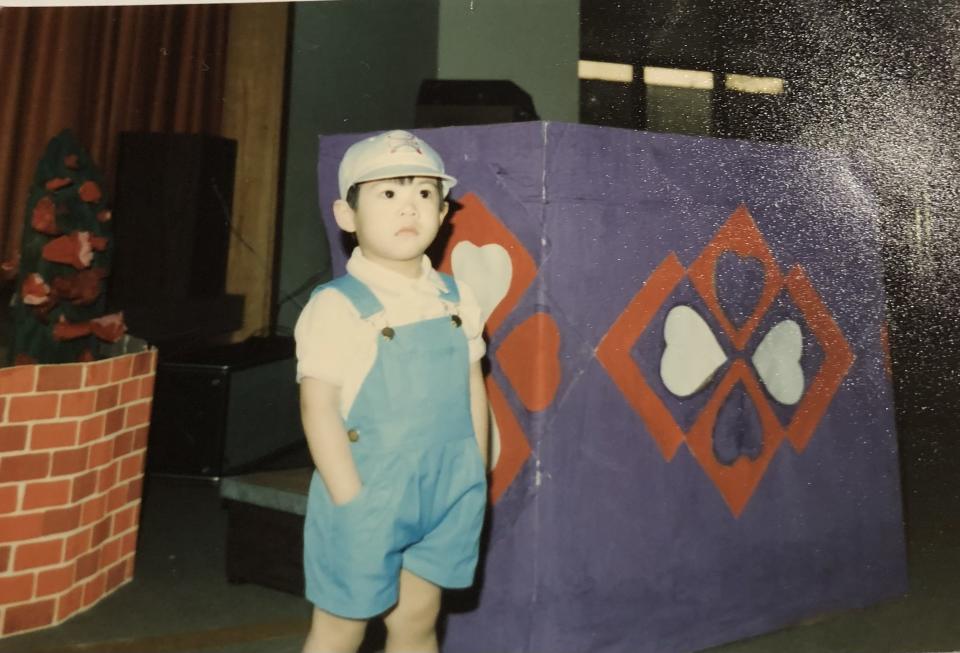
Authentic Queer representation is especially vital at a time when anti-trans legislation is being introduced all across the US.
The absence of that representation made me feel like an outsider in my own skin. But EEAAO beautifully portrayed a Queer female API story with a message of radical acceptance: no matter what, your parents will go to the ends of the Earth, or multiverse, to save you — no matter who you love. I was lucky enough to experience that love, acceptance, and joy from my parents when I got married to my now-wife last year.
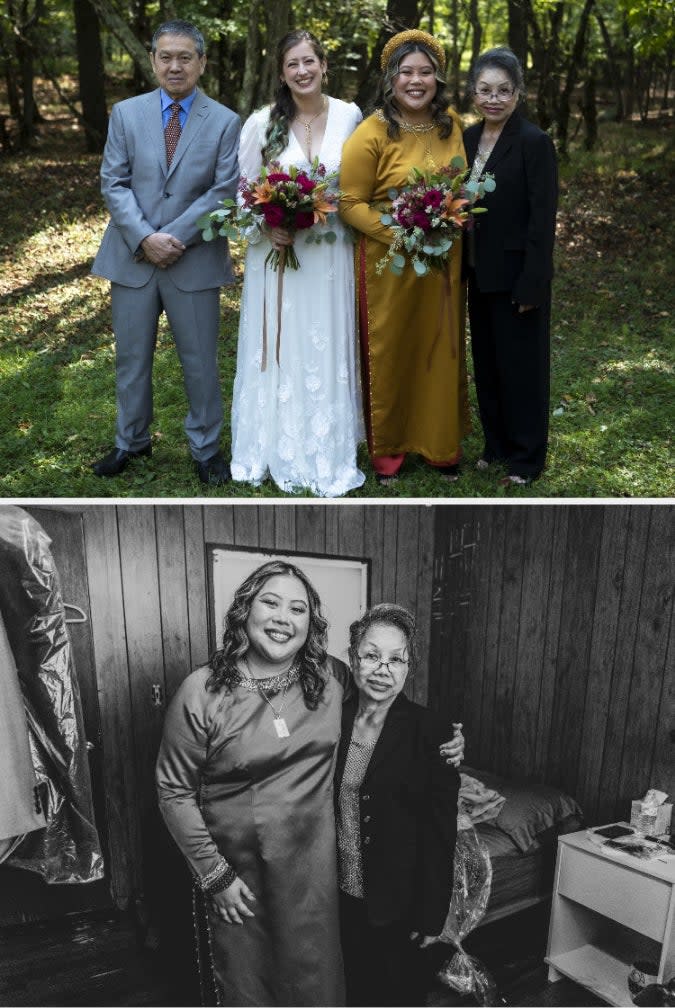
And I'm not alone in feeling seen:
When I first watched EEAAO I cried tears from a place I didn’t know existed, let alone see in a film — cut through the brilliant layers & it is at heart a mother loving her queer daughter so much she would tear through the very fabric of reality to save her from psychic suicide —
4.The last few years have been brutal for the API community, a culmination of decades of racism, xenophobia, white supremacist language, and hate crimes — but the last few years have also seen API actors everywhere all at once in Hollywood. And one way to overcome biases is through exposure work. There's real power in representation. It's easy to downplay the power of pop culture, but these wins celebrate our community and, more broadly, push back against the narrative that we are unworthy.
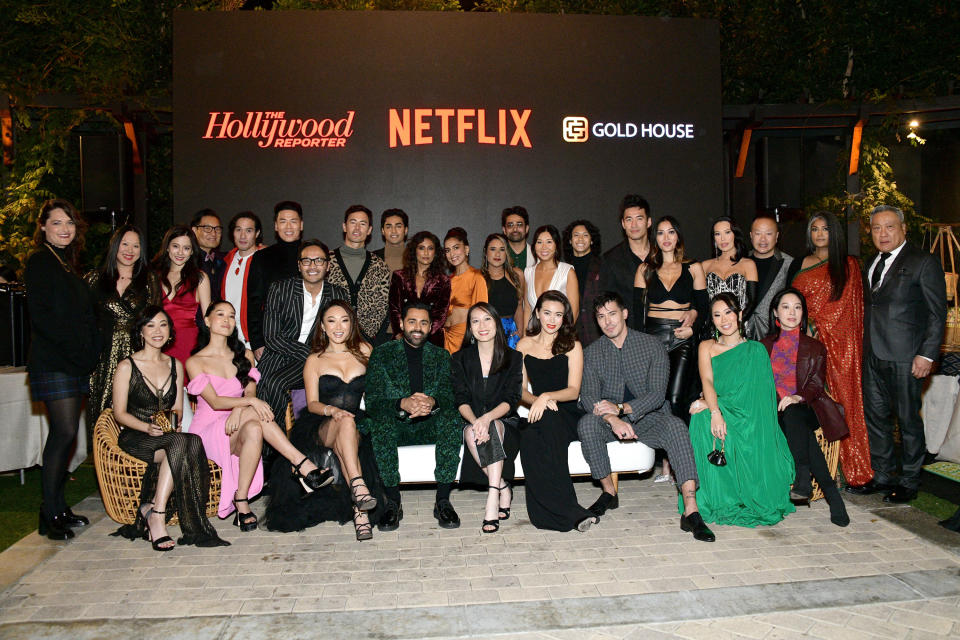
The API community has seen an increase in hate crimes after former President Donald Trump used Asian people as a scapegoat for the COVID-19 pandemic. We have been targeted and, in so many ways, have had to fight for our power to remain.
Most recently, we witnessed the heartbreaking Monterey Park and Half Moon Bay mass shootings around Lunar New Year. Our community is tired. Our mental health has been relentlessly riddled with anxiety and paranoia. We want peace.
Take James Hong's acceptance speech for best ensemble at the SAG Awards, for example. It gave poignant insight into the ugly nature of racism in Hollywood — including casting white actors who taped their eyes back for Asian characters instead of casting Asian actors. I teared up when James, at 94 years old after a 69-year career, shouted from his gut on stage, "The producers said the Asians were not good enough and they are not box office. But look at us now!"
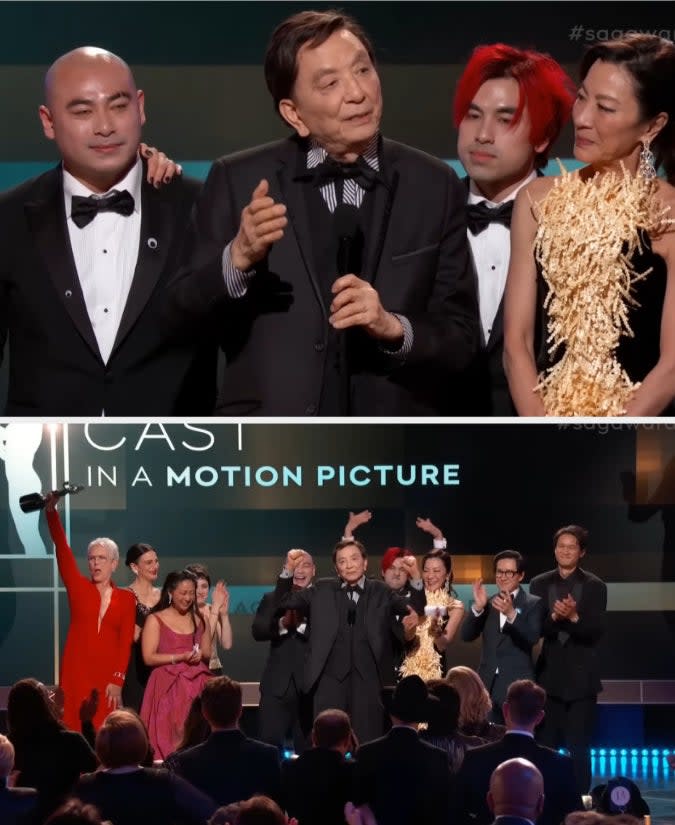
5.Lastly, everything about Everything, Everywhere All At Once is Asian excellence. The movie is now the most-awarded film in history with more than 260 awards. If you've seen it, you know it's brilliant. It has a sharp script, an ingenious plot, and nuanced, skilled acting. That makes co-director Daniel Kwan's revelation of imposter syndrome during his acceptance speech even more humbling and relatable. As we continue to trash the problematic model minority myth, EEAAO helps us uplift our hard-fought and hard-earned wins.
